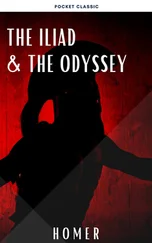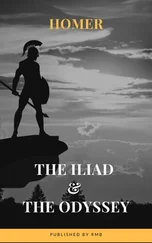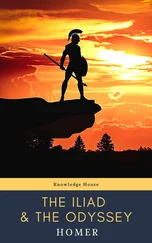John Milton - The Epic Poems Anthology - The Iliad, The Odyssey, The Aeneid, The Divine Comedy...
Здесь есть возможность читать онлайн «John Milton - The Epic Poems Anthology - The Iliad, The Odyssey, The Aeneid, The Divine Comedy...» — ознакомительный отрывок электронной книги совершенно бесплатно, а после прочтения отрывка купить полную версию. В некоторых случаях можно слушать аудио, скачать через торрент в формате fb2 и присутствует краткое содержание. Жанр: unrecognised, на английском языке. Описание произведения, (предисловие) а так же отзывы посетителей доступны на портале библиотеки ЛибКат.
- Название:The Epic Poems Anthology : The Iliad, The Odyssey, The Aeneid, The Divine Comedy...
- Автор:
- Жанр:
- Год:неизвестен
- ISBN:нет данных
- Рейтинг книги:4 / 5. Голосов: 1
-
Избранное:Добавить в избранное
- Отзывы:
-
Ваша оценка:
- 80
- 1
- 2
- 3
- 4
- 5
The Epic Poems Anthology : The Iliad, The Odyssey, The Aeneid, The Divine Comedy...: краткое содержание, описание и аннотация
Предлагаем к чтению аннотацию, описание, краткое содержание или предисловие (зависит от того, что написал сам автор книги «The Epic Poems Anthology : The Iliad, The Odyssey, The Aeneid, The Divine Comedy...»). Если вы не нашли необходимую информацию о книге — напишите в комментариях, мы постараемся отыскать её.
This collection includes:
–The Iliad and The Odyssey by Homer
–The Aeneid, by Virgil
–The Divine Comedy, by Dante Alighieri
–Venus and Adonis, by William Shakespeare
–Paradise Lost and Paradise Regained, by John Milton
The Epic Poems Anthology : The Iliad, The Odyssey, The Aeneid, The Divine Comedy... — читать онлайн ознакомительный отрывок
Ниже представлен текст книги, разбитый по страницам. Система сохранения места последней прочитанной страницы, позволяет с удобством читать онлайн бесплатно книгу «The Epic Poems Anthology : The Iliad, The Odyssey, The Aeneid, The Divine Comedy...», без необходимости каждый раз заново искать на чём Вы остановились. Поставьте закладку, и сможете в любой момент перейти на страницу, на которой закончили чтение.
Интервал:
Закладка:
The others still fought on, and the battle-cry rose to heaven without ceasing. Aeneas sprang on Aphareus son of Caletor, and struck him with a spear in his throat which was turned towards him; his head fell on one side, his helmet and shield came down along with him, and death, life’s foe, was shed around him. Antilochus spied his chance, flew forward towards Thoon, and wounded him as he was turning round. He laid open the vein that runs all the way up the back to the neck; he cut this vein clean away throughout its whole course, and Thoon fell in the dust face upwards, stretching out his hands imploringly towards his comrades. Antilochus sprang upon him and stripped the armour from his shoulders, glaring round him fearfully as he did so. The Trojans came about him on every side and struck his broad and gleaming shield, but could not wound his body, for Neptune stood guard over the son of Nestor, though the darts fell thickly round him. He was never clear of the foe, but was always in the thick of the fight; his spear was never idle; he poised and aimed it in every direction, so eager was he to hit some one from a distance or to fight him hand to hand.
As he was thus aiming among the crowd, he was seen by Adamas son of Asius, who rushed towards him and struck him with a spear in the middle of his shield, but Neptune made its point without effect, for he grudged him the life of Antilochus. One half, therefore, of the spear stuck fast like a charred stake in Antilochus’s shield, while the other lay on the ground. Adamas then sought shelter under cover of his men, but Meriones followed after and hit him with a spear midway between the private parts and the navel, where a wound is particualrly painful to wretched mortals. There did Meriones transfix him, and he writhed convulsively about the spear as some bull whom mountain herdsmen have bound with ropes of withes and are taking away perforce. Even so did he move convulsively for a while, but not for very long, till Meriones came up and drew the spear out of his body, and his eyes were veiled in darkness.
Helenus then struck Deipyrus with a great Thracian sword, hitting him on the temple in close combat and tearing the helmet from his head; the helmet fell to the ground, and one of those who were fighting on the Achaean side took charge of it as it rolled at his feet, but the eyes of Deipyrus were closed in the darkness of death.
On this Menelaus was grieved, and made menacingly towards Helenus, brandishing his spear; but Helenus drew his bow, and the two attacked one another at one and the same moment, the one with his spear, and the other with his bow and arrow. The son of Priam hit the breastplate of Menelaus’s corslet, but the arrow glanced from off it. As black beans or pulse come pattering down on to a threshing-floor from the broad winnowing-shovel, blown by shrill winds and shaken by the shovel—even so did the arrow glance off and recoil from the shield of Menelaus, who in his turn wounded the hand with which Helenus carried his bow; the spear went right through his hand and stuck in the bow itself, so that to his life he retreated under cover of his men, with his hand dragging by his side—for the spear weighed it down till Agenor drew it out and bound the hand carefully up in a woollen sling which his esquire had with him.
Pisander then made straight at Menelaus—his evil destiny luring him on to his doom, for he was to fall in fight with you, O Menelaus. When the two were hard by one another the spear of the son of Atreus turned aside and he missed his aim; Pisander then struck the shield of brave Menelaus but could not pierce it, for the shield stayed the spear and broke the shaft; nevertheless he was glad and made sure of victory; forthwith, however, the son of Atreus drew his sword and sprang upon him. Pisander then seized the bronze battle-axe, with its long and polished handle of olive wood that hung by his side under his shield, and the two made at one another. Pisander struck the peak of Menelaus’s crested helmet just under the crest itself, and Menelaus hit Pisander as he was coming towards him, on the forehead, just at the rise of his nose; the bones cracked and his two gore-bedrabbled eyes fell by his feet in the dust. He fell backwards to the ground, and Menelaus set his heel upon him, stripped him of his armour, and vaunted over him saying, “Even thus shall you Trojans leave the ships of the Achaeans, proud and insatiate of battle though you be: nor shall you lack any of the disgrace and shame which you have heaped upon myself. Cowardly she-wolves that you are, you feared not the anger of dread Jove, avenger of violated hospitality, who will one day destroy your city; you stole my wedded wife and wickedly carried off much treasure when you were her guest, and now you would fling fire upon our ships, and kill our heroes. A day will come when, rage as you may, you shall be stayed. O father Jove, you, who they say art above all both gods and men in wisdom, and from whom all things that befall us do proceed, how can you thus favour the Trojans—men so proud and overweening, that they are never tired of fighting? All things pall after a while—sleep, love, sweet song, and stately dance—still these are things of which a man would surely have his fill rather than of battle, whereas it is of battle that the Trojans are insatiate.”
So saying Menelaus stripped the blood-stained armour from the body of Pisander, and handed it over to his men; then he again ranged himself among those who were in the front of the fight.
Harpalion son of King Pylaemenes then sprang upon him; he had come to fight at Troy along with his father, but he did not go home again. He struck the middle of Menelaus’s shield with his spear but could not pierce it, and to save his life drew back under cover of his men, looking round him on every side lest he should be wounded. But Meriones aimed a bronze-tipped arrow at him as he was leaving the field, and hit him on the right buttock; the arrow pierced the bone through and through, and penetrated the bladder, so he sat down where he was and breathed his last in the arms of his comrades, stretched like a worm upon the ground and watering the earth with the blood that flowed from his wound. The brave Paphlagonians tended him with all due care; they raised him into his chariot, and bore him sadly off to the city of Troy; his father went also with him weeping bitterly, but there was no ransom that could bring his dead son to life again.
Paris was deeply grieved by the death of Harpalion, who was his host when he went among the Paphlagonians; he aimed an arrow, therefore, in order to avenge him. Now there was a certain man named Euchenor, son of Polyidus the prophet, a brave man and wealthy, whose home was in Corinth. This Euchenor had set sail for Troy well knowing that it would be the death of him, for his good old father Polyidus had often told him that he must either stay at home and die of a terrible disease, or go with the Achaeans and perish at the hands of the Trojans; he chose, therefore, to avoid incurring the heavy fine the Achaeans would have laid upon him, and at the same time to escape the pain and suffering of disease. Paris now smote him on the jaw under his ear, whereon the life went out of him and he was enshrouded in the darkness of death.
Thus then did they fight as it were a flaming fire. But Hector had not yet heard, and did not know that the Argives were making havoc of his men on the left wing of the battle, where the Achaeans ere long would have triumphed over them, so vigorously did Neptune cheer them on and help them. He therefore held on at the point where he had first forced his way through the gates and the wall, after breaking through the serried ranks of Danaan warriors. It was here that the ships of Ajax and Protesilaus were drawn up by the sea-shore; here the wall was at its lowest, and the fight both of man and horse raged most fiercely. The Boeotians and the Ionians with their long tunics, the Locrians, the men of Phthia, and the famous force of the Epeans could hardly stay Hector as he rushed on towards the ships, nor could they drive him from them, for he was as a wall of fire. The chosen men of the Athenians were in the van, led by Menestheus son of Peteos, with whom were also Pheidas, Stichius, and stalwart Bias: Meges son of Phyleus, Amphion, and Dracius commanded the Epeans, while Medon and staunch Podarces led the men of Phthia. Of these, Medon was bastard son to Oileus and brother of Ajax, but he lived in Phylace away from his own country, for he had killed the brother of his stepmother Eriopis, the wife of Oileus; the other, Podarces, was the son of Iphiclus son of Phylacus. These two stood in the van of the Phthians, and defended the ships along with the Boeotians.
Читать дальшеИнтервал:
Закладка:
Похожие книги на «The Epic Poems Anthology : The Iliad, The Odyssey, The Aeneid, The Divine Comedy...»
Представляем Вашему вниманию похожие книги на «The Epic Poems Anthology : The Iliad, The Odyssey, The Aeneid, The Divine Comedy...» списком для выбора. Мы отобрали схожую по названию и смыслу литературу в надежде предоставить читателям больше вариантов отыскать новые, интересные, ещё непрочитанные произведения.
Обсуждение, отзывы о книге «The Epic Poems Anthology : The Iliad, The Odyssey, The Aeneid, The Divine Comedy...» и просто собственные мнения читателей. Оставьте ваши комментарии, напишите, что Вы думаете о произведении, его смысле или главных героях. Укажите что конкретно понравилось, а что нет, и почему Вы так считаете.












